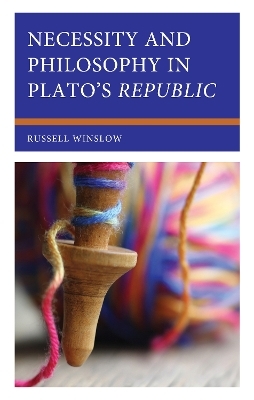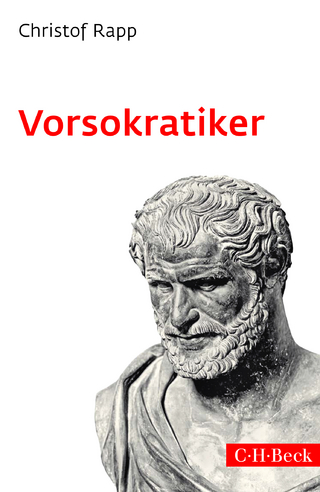
Necessity and Philosophy in Plato's Republic
Seiten
2024
Lexington Books/Fortress Academic (Verlag)
978-1-6669-5857-7 (ISBN)
Lexington Books/Fortress Academic (Verlag)
978-1-6669-5857-7 (ISBN)
Necessity and Philosophy in Plato’s Republic offers an interpretation of the concept of necessity in what is perhaps Plato’s most read dialogue. The book argues that to read the Republic through the lens of necessity is to reimagine what this pervasive concept might mean for us and for the limits of human reason.
Necessity and Philosophy in Plato’s Republic offers an interpretation of the concept of necessity in what is perhaps Plato’s most read dialogue. The word “necessity” (anagkē) appears hundreds of times in the text in many grammatical forms, about as often as the frequently studied term “good.” Yet, there exists little commentary on the ontological status of necessity. Russell Winslow argues that when the reader analyzes the Republic through the lens of necessity, a novel interpretation emerges. On the one hand, the concept of necessity articulated in the Republic is original, insofar as it includes phenomena not commonly attributed to necessity. Namely, necessity governs not only those motions that do not vary and cannot be otherwise, but also those that wander randomly by erotic desire and by chance. Necessity in the Republic, thus, occasions a rethinking of what this crucial concept might mean for us. On the other hand, interpreting the Republic through the lens of necessity allows a reading of Plato to develop that emphasizes the structures of finitude in human life and the limits of reason. This book argues, therefore, that philosophy remains subtended and limited by necessity in unavoidable ways.
Necessity and Philosophy in Plato’s Republic offers an interpretation of the concept of necessity in what is perhaps Plato’s most read dialogue. The word “necessity” (anagkē) appears hundreds of times in the text in many grammatical forms, about as often as the frequently studied term “good.” Yet, there exists little commentary on the ontological status of necessity. Russell Winslow argues that when the reader analyzes the Republic through the lens of necessity, a novel interpretation emerges. On the one hand, the concept of necessity articulated in the Republic is original, insofar as it includes phenomena not commonly attributed to necessity. Namely, necessity governs not only those motions that do not vary and cannot be otherwise, but also those that wander randomly by erotic desire and by chance. Necessity in the Republic, thus, occasions a rethinking of what this crucial concept might mean for us. On the other hand, interpreting the Republic through the lens of necessity allows a reading of Plato to develop that emphasizes the structures of finitude in human life and the limits of reason. This book argues, therefore, that philosophy remains subtended and limited by necessity in unavoidable ways.
Russell Winslow teaches philosophy at St. John's College, Santa Fe.
Acknowledgments
Introduction
Chapter 1: Philosophical Nature: Natural Necessity
Chapter 2: The Necessity of the Greatest Study: The Good
Chapter 3: Child of the Good: on Light and Desire
Chapter 4: Necessity in the Intelligible Region of the Divided Line
Chapter 5: Necessity in the Cave
Chapter 6: Necessity and the Highest Studies
Chapter 7: Necessity and the Song itself: Dialectic
Chapter 8: On Bastards and Orphans
Chapter 9: Necessity and Democracy
Chapter 10: The Spindle of Necessity
Bibliography
| Erscheinungsdatum | 24.07.2024 |
|---|---|
| Sprache | englisch |
| Maße | 159 x 238 mm |
| Gewicht | 535 g |
| Themenwelt | Geisteswissenschaften ► Philosophie ► Philosophie Altertum / Antike |
| Geisteswissenschaften ► Sprach- / Literaturwissenschaft ► Sprachwissenschaft | |
| ISBN-10 | 1-6669-5857-3 / 1666958573 |
| ISBN-13 | 978-1-6669-5857-7 / 9781666958577 |
| Zustand | Neuware |
| Informationen gemäß Produktsicherheitsverordnung (GPSR) | |
| Haben Sie eine Frage zum Produkt? |
Mehr entdecken
aus dem Bereich
aus dem Bereich


